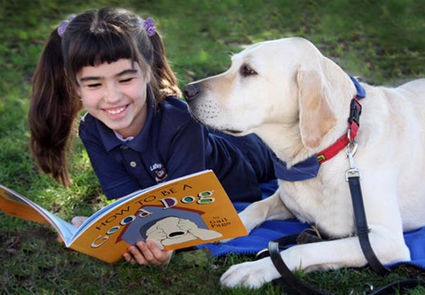Divine Intervention: Maggie's Story
It's a Dog's Life
Because dogs and humans are both highly social animals, social learning theory applies to both species respectively. There is also research into the theory that social learning in domestic dogs has been heavily influenced by dogs' co-evolution with humans. In other words, dogs learn from their own canine social groups as well as from their human group or "pack" members. Social learning can reduce the costs (e.g. time, effort, risk) involved in the acquisition of resources or new skills. Furthermore, the capability to use information provided by others is a prerequisite for the evolution of culture. One context in which information is passed between members of a social group is play, and the benefits of play are very evident in the learning processes of both children and dogs. A study on children living in Mother Teresa's Orphanage in Dehli, India, looked at the effects of daily playtime on orphans' psycho motor and social development over a thirty day period, as compared to a group that received only the minimum of care as in feeding and bathing, but were denied social interaction. As hypothesized, the children who were able to play each day even for a short time became more active, responsive and independent than those who were deprived.
Similar studies in shelter dogs show congruent results. Aimee Sadler is a veteran animal trainer who specializes in dogs' behavioral problems. Aside from working with private clients, she helps shelters form playgroups as a way of socializing dogs and ultimately making them more adoptable. Sadler states, "Playgroups are a natural way for dogs to blow off steam and counteract the stresses of shelter life. Through group interactions, dogs teach each other how to behave, addressing such problems as resource guarding, dog-on-dog aggression, and on-leash reactivity". The playgroups provide much needed and sorely lacking stimulation in the areas of physical exercise, mental engagement and stress relief. And perhaps most importantly, carefully structured playtime provides the foundation for social learning among dogs, many of whom have never been properly introduced or otherwise interacted with other dogs, which is a fundamental reason dogs end up in shelters to begin with.
Furthermore, watching dogs play is a major learning opportunity for human caregivers, and seeing different dogs' social skills and play styles helps them make better adoptive matches.
In summary, giving kids and dogs a chance to thrive and learn from their peers in social situations is just as critical to health and well-being as is eating and sleeping.





